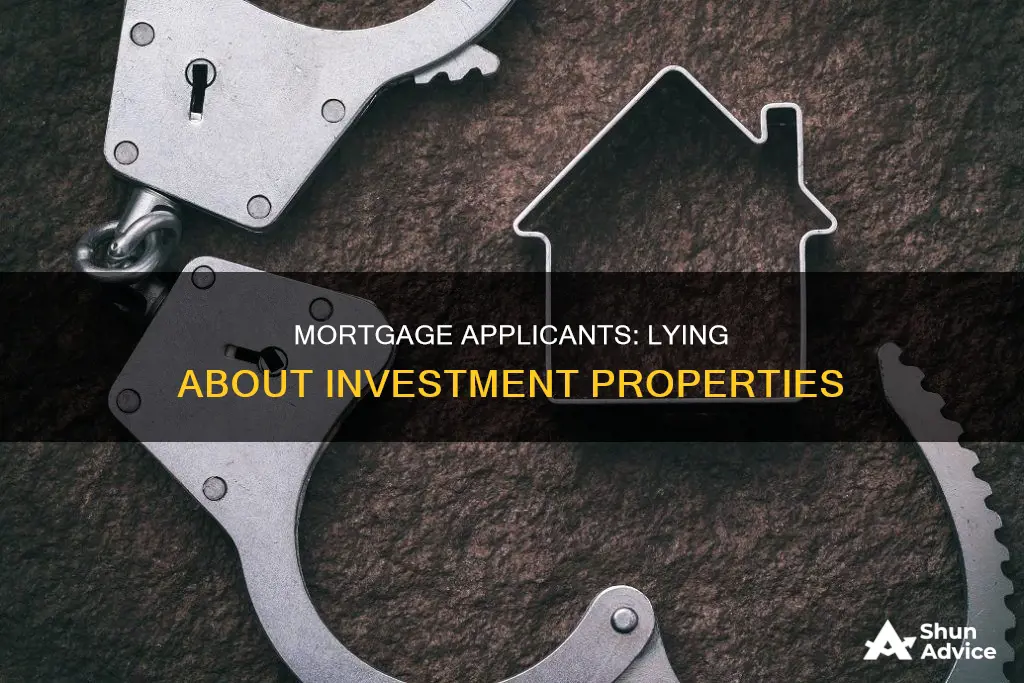
Lying about a property being your primary residence on a mortgage application is a form of mortgage fraud known as occupancy fraud. This is when a borrower lies about the occupancy status of a property, stating it will be owner-occupied to benefit from lower interest rates. This type of fraud is common among smaller investors, such as house flippers and those who use home-sharing platforms like Airbnb. The consequences of occupancy fraud can be severe, including financial penalties, prosecution, and even prison time. Lenders are increasingly employing more sophisticated methods to detect these lies, such as using digital programs that utilise algorithms and data analysis to pinpoint borrowers who have lied on their applications.
| Characteristics | Values |
|---|---|
| Why people lie about investment primary residence on mortgage application | To get lower interest rates and fees |
| To benefit from the lower interest rates and fees charged on a residential mortgage than a buy-to-let | |
| To get lower down payment requirements | |
| To get easier qualification requirements | |
| What happens if people lie about investment primary residence on mortgage application | It is considered mortgage fraud |
| It may lead to financial penalties | |
| It may lead to legal action | |
| It may lead to prison time | |
| Lenders can call the loan and demand immediate payment of the full mortgage balance | |
| Lenders can start foreclosure proceedings | |
| Lenders can refer the case to the FBI | |
| How lenders verify owner occupancy | Lenders hire people to go knock on doors to verify whether borrowers actually live in the home |
| Lenders use data analysis and algorithms to spot borrowers who may have lied on their mortgage applications | |
| Lenders use data from credit bureau files, utility bills, and tax information to determine whether addresses are different than those used on loan applications |
What You'll Learn

People lie about investment primary residence to get better interest rates
Lenders offer lower interest rates on owner-occupied homes compared to investment properties because they deem owner-occupied homes to be less risky. The reasoning is that borrowers are less likely to default on their mortgages if they are living in the property, as they would not want to lose their primary home. As a result, lenders offer lower interest rates and may have less strict qualification requirements for owner-occupied mortgages.
On the other hand, investment properties are considered higher risk because borrowers are more likely to default if it is not their primary residence. Therefore, interest rates are typically higher for investment properties, and qualification requirements may be stricter.
By lying about their intention to occupy the property, borrowers can secure lower interest rates and may find it easier to qualify for the mortgage. However, this is considered mortgage fraud and can have serious consequences. If the lender or bank discovers the lie, they may demand immediate repayment of the full mortgage balance. If the borrower cannot repay the balance, the lender may initiate foreclosure proceedings, leading to the loss of the property. In addition, mortgage fraud can result in financial penalties, legal action, and even prison time.
It is important to note that there are situations where renting out an owner-occupied property is not considered occupancy fraud. For example, if a homeowner needs to move due to a change in employment or other circumstances beyond their control, they may be allowed to rent out the property without committing fraud. However, it is always best to check with the mortgage lender before renting out an owner-occupied property to avoid any potential legal or financial repercussions.
Poor People: Investing Risk?
You may want to see also

This is a common form of mortgage fraud
The incidence of occupancy misrepresentation rose by 20% between 2011 and 2013, according to giant investor Fannie Mae. Lenders and loan officers confirm that they regularly encounter falsehoods about occupancy. This type of fraud is more common among smaller investors, such as those who flip houses or rent out properties through home-sharing platforms. During the financial crisis of 2020, all types of mortgage fraud increased, with occupancy fraud risk rising by 22.92% in 2021 over previous years.
Committing occupancy fraud can have serious consequences. It is a federal offence and is considered banking fraud. Those who are found out may face severe financial penalties, prosecution, and even prison time. Lenders can call in the loan, demanding immediate repayment of the full mortgage balance. If the borrower cannot repay, the lender may initiate foreclosure proceedings, destroying the borrower's original plans. In cases involving multiple misrepresentations, lenders can refer the case to the FBI for further investigation and prosecution.
Robinhood: Still Relevant?
You may want to see also

Lenders see owner-occupied properties as lower risk
Secondly, delinquency rates tend to be lower for owner-occupied properties. Borrowers do not want to lose their own homes, and the stigma attached to losing an investment property is much lower, since losses can be written off for tax purposes.
Thirdly, lenders view investment properties as higher risk because people will usually work harder to repay a mortgage on their own home. This means that lenders are more comfortable lending larger amounts to owner-occupiers, and they offer better loan terms and lower interest rates to borrowers who plan to live in their homes.
Finally, owner-occupied homes are the least likely to go into default and foreclosure. Therefore, the interest rates offered on owner-occupied properties are lower than those for investment properties. Typically, lenders charge 0.5% to 1% more in interest for investment properties that are not occupied by the owner.
Homes: The Ultimate Investment?
You may want to see also

Buyers may save thousands on down payments
Lying about investment in a primary residence on a mortgage application is illegal and is considered occupancy fraud or mortgage fraud. However, it is a common lie that home buyers tell, and one that can save them thousands.
People may lie about their intention to occupy a property as their primary residence because mortgage rates are generally lower and qualification is easier. Banks consider lending to someone who is using the home as their primary residence less risky. The motivation for the borrower to keep their home is higher, and so the risk is lower, which means lower interest rates and less strict requirements.
By lying about occupancy, buyers can save thousands on the down payment. For example, a Federal Housing Administration-backed mortgage could go as low as 3.5% instead of the standard 10-20% down payment.
With the rapid rise of rental investment groups and conversions of foreclosed homes into rental properties, it is not surprising that there has been more misrepresentation about occupancy in recent years. In the case of a second home or investment property, banks deem the risk to be higher, and so interest rates are higher, and qualifications can be stricter.
Lying on a mortgage application can have serious legal and financial consequences. Lenders can demand immediate full payment of the outstanding mortgage balance, and if the borrower cannot pay, the lender can move to foreclose. Committing occupancy fraud can also result in fines, penalties, and even jail time.
Insurance: A Safe Investment Bet?
You may want to see also

Lying on a mortgage application can lead to prosecution
Lying on a mortgage application is considered mortgage fraud and can lead to prosecution. It is a serious crime that can carry hefty fines and even prison sentences.
Mortgage fraud occurs when an individual provides false or misleading information on a mortgage application to obtain a loan or secure more favourable loan terms than they would otherwise qualify for. This can take various forms, such as misrepresenting income, assets, debt, employment history, or the property's intended use.
Lenders offer lower interest rates for owner-occupied properties compared to investment properties. Therefore, borrowers may lie about the occupancy status of the property to get better interest rates on their mortgages. This is known as occupancy fraud and is a relatively common form of mortgage fraud.
If a lender discovers that a borrower has lied on their mortgage application, they can demand immediate repayment of the full mortgage balance. If the borrower cannot afford to repay the loan, the lender can initiate foreclosure proceedings, resulting in the loss of the property.
In addition to financial penalties, lying on a mortgage application can also result in legal consequences, including criminal charges, civil penalties, and even prison time. The FBI may get involved and investigate cases of mortgage fraud, especially if there are multiple misrepresentations. Individuals found guilty of mortgage fraud may face fines, imprisonment, and damage to their credit score and reputation.
It is important to note that there is no such thing as a harmless white lie when it comes to a mortgage application. Any misrepresentation or omission of information can have severe consequences. Therefore, it is crucial to be honest and transparent throughout the application process.
Investing: Nice People Turn Nasty
You may want to see also
Frequently asked questions
Occupancy fraud is a form of mortgage fraud that occurs when the borrower lies about the occupancy status of the property, stating it will be owner-occupied. This is done to get better interest rates on mortgages as lenders offer lower rates for owner-occupied homes compared to investment properties.
Lying on a mortgage application is considered mortgage fraud and can lead to financial penalties, legal action, and even prison time. Lenders can demand immediate repayment of the full mortgage balance and if the borrower is unable to repay, the lender can initiate foreclosure proceedings.
Occupancy fraud is a common type of mortgage fraud, especially among smaller investors such as house flippers and those who use home-sharing platforms like Airbnb. The incidence of occupancy misrepresentation rose by 20% between 2011 and 2013, according to Fannie Mae's sampling of loans involving known fraud.







